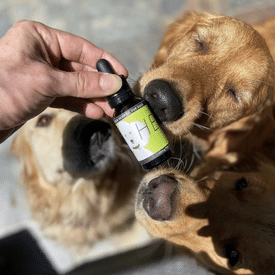CBD vs NSAIDs: Managing Your Pet’s Pain & Inflammation

Pain from inflammation often affects dogs at some point in their lifetimes. Some begin experiencing pain from a traumatic incident at a young age whereas others don’t experience inflammation until they are well into their senior years. It’s natural for the body to begin to experience inflammation, but understanding what is best to help with the pain from the inflammation is important to maintaining proper health.
Over-the-counter drugs, like NSAIDs, and prescription anti-inflammatory medications are readily available to pet parents. They’re chosen because they do treat the pain and inflammation quickly, but unfortunately, they don’t get down to the root of the problem. They kind of just cover it up with a band-aid until the medicine wears off. And, NSAIDs are notoriously known for their ‘not-so-great’ side effects.
Table of Contents
How Do NSAIDs Work?
When the body begins to produce inflammation (regardless of where in the body it is), proastaglandins begin to form to help with blood clotting. NSAIDs work by blocking enzymes known as COX-1 and COX-2; the enzymes responsible for creating prostaglandin.
Like other anti-inflammatory medications, NSAIDs inhibit or prevent the release of chemical compounds that generally respond to inflammation situations. Unfortunately, NSAIDs are not selective in which of the enzymes (COX-1 or COX-2) it inhibits. This results in more side effects being present.
Side Effects Of NSAIDs
All NSAIDs have the ability to cause adverse reactions (some of which can be fatal). Since NSAIDs affect the COX-1 enzymes responsible for the stomach and intestinal tract, one of the most common side effects is vomiting. The most serious side effect is gastrointestinal (GI) ulceration.
NSAIDs cause the inability of the GI tract to bring out the protective soldiers in the body. Since the soldiers aren’t able to do their jobs, the barrier protecting the stomach is not able to prevent injury to cells and blood vessels. This is where the ulcers come in. No protection, no barrier. No barrier, the bad guys win.
Other side effects include: Bleeding in the GI tract, ulcers, heartburn, liver problems, kidney problems, high blood pressure, heart attack, stroke, heart failure, or even death.
[optin-monster-shortcode id=”o2upz8rjlqeytm1qa7n6″]
Treating Inflammation With CBD
Inflammation is the root cause for a lot of issues. Allergies, anxiety, chronic pain, autoimmune disease, and diabetes are all examples of conditions associated with inflammation in the body. Unlike NSAIDs, which are nonselective, CBD reduces pain by encouraging CB2 receptors in the body (the ones that interact with pain and inflammation) to produce neurotransmitters known as endocannabinoids.
Research has found many conditions involving endocannabinoid deficiency can be significantly improved with the implementation of cannabidiol (CBD) in the diet.
Cornell University’s College of Veterinary Medicine conducted research on the pharmacokinetics of cannabinoids for dogs. The study was 8-months in length and primarily focused on dogs suffering from osteoarthritis. Researchers recognized each dog’s pain decreased significantly with no side effects when being treated with CBD.
“Pharmacokinetics revealed an elimination half-life of 4.2 h at both doses and no observable side effects. Clinically, canine brief pain inventory and Hudson activity scores showed a significant decrease in pain and increase in activity (p < 0.01) with CBD oil. Veterinary assessment showed decreased pain during CBD treatment (p < 0.02). No side effects were reported by owners… This pharmacokinetic and clinical study suggests that 2 mg/kg of CBD twice daily can help increase comfort and activity in dogs with OA.”
Another study titled “Pharmacokinetics, Safety, and Clinical Efficacy of Cannabidiol Treatment in Osteoarthritic Dogs” found that 2 mg/kg of CBD twice daily can help increase comfort and activity in dogs with Osteoarthritis.
A study published in 2006 in Current Neuropharmacology also found CBD’s therapeutic properties for both people and pets suffering from chronic pain.
Inflammatory Conditions Improved With Cannabidiol
Full spectrum hemp extract (CBD) has been proven to shorten the duration and frequency of inflammation-related issues including the following:
A study conducted at Cornell University “ included a randomized, placebo-controlled, double-blind crossover study that appeared to show that dogs treated with CBD oil have a clinically significant reduction in pain and an increase in activity.”
Another study indicated “migraine, fibromyalgia, IBS and related conditions display common clinical, biochemical and pathophysiological patterns that suggest an underlying clinical endocannabinoid deficiency that may be suitably treated with cannabinoid medicines.”
NSAIDs Versus CBD
Research is being conducted on a continuous basis to determine the role CBD plays in pain and inflammation. But, we do know it helps significantly reduce inflammation already. And, we also know there are serious side effects present with long-term use of NSAIDs whereas there have been no serious side effects presented from the use of CBD.
About Angela Ardolino

Angela Ardolino is a holistic pet expert who has been caring for animals for over 20 years and operates a rescue farm, Fire Flake Farm, in Florida. She is also the owner of Beautify the Beast, a natural pet salon and shop. After getting her certificate in Medical Cannabis Biology and Therapeutic use from the University of Vermont School of Medicine, she founded CBD Dog Health to provide high quality, all-natural medical cannabis products designed specifically for pets. Angela has seven dogs, Odie a 12-year-old mini-schnauzer, Nina an 8-year-old Doberman. Jolene a 7-year-old mutt, Maza a 7-year-old mutt, Rhemi an 8-year-old poodle, Potato a 15-year-old shih-tzu, and Miss Daisie a 15-year-old black lab, plus 4-10 more at any time she is fostering or boarding. She uses Full Spectrum Hemp Extract on all her pets at her rescue farm every day, and has since 2016. She is a member of the Society of Cannabis Clinicians, the Veterinary Cannabis Association and has trained hundreds medical doctors and veterinarians about the therapeutic uses of medical cannabis on animals. Visit www.angelaardolino.com for more information.















